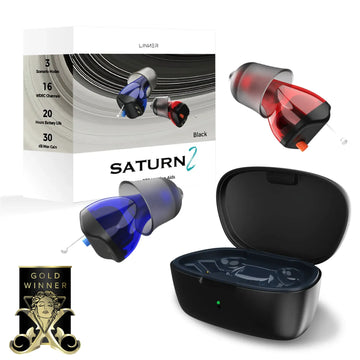
Owning Your Hearing Loss
So you've recently been diagnosed with hearing loss, or you've had it for a while, but you've just been managing and haven't done anything about it, or you aren't sure what resources are available to help you cope and overcome your inability. There are several ways you can begin working towards a better quality life. Knowing your rights is a big, adapting your hearing environment to your needs, and learning about different assistive listening devices and other devices for individuals with hearing loss.
When you have a grasp on your hearing situation, it is important that you take the time to become acquainted with systems and technology that are designed with you in mind. In this article, we will cover a few basic resources and need-to-know's.
The Americans with Disabilities Act (ADA)
If you are in the United States and have any number of disabilities (which includes hearing loss),you are an American with a Disability. As such, you are represented under the ADA law which outlines what rights are given to such individuals.
For an individual with hearing loss, depending on the severity and the type, there are opportunities that are offered through the ADA for private and public sector workplaces as well as citizen protection. Some of these opportunities include communication aids such as amplified phones, teletype devices (TTY or TDD), live captioning, and interpreters.
Let's talk a little about each of these for a moment so we have an understanding of what they can do for you.
Amplified Phones
An amplified telephone is just what you would expect by its name, a phone that amplifies the incoming signal. These devices are created specifically for individuals with hearing loss and are great for offices and home land lines. This would be considered a reasonable accommodation and provided by your employer. For individuals who want these for a landline, there are government programs that provide amplified phones, you may need a certified letter from a hearing health provider or primary care provider, but if you have a hearing loss, that shouldn't be difficult to obtain. If you wear hearing aids, you may also be interested to know that many hearing aids have a telecoil feature which can help create a good connection to many landline telephones, and some cell phones. Telecoil is useful for many other capabilities too such as looping into a church building or the courtroom.
Teletype device (TTY) or Telecommunications Device for the Deaf (TDD)
These are devices that can be used by individuals who struggle to hear. This works with the assistance of an operator. The individual using the teletype device (we'll call the receiver) can use the phone by talking or typing. the individual on the other end (we'll call the sender) will talk directly to the receiver. the operator will take what the sender says and type it into text that will be displayed on the TTY on the receiver's end. The receiver can then respond either orally over the phone or by typing a response back. If the receiver responds using the text feature, the message will be displayed at the operator's screen, with this the operator will read the message to the sender. This is an effective way for individuals to communicate and has been employed since the 1850's.
Live Captioning
Live captioning is another tool that is a great resource. Like a TTY, this is a device that is often operated by someone listening to a presenter and converting it to text. With the advances of modern technology and AI, there are several applications and programs now that can do this job with some pretty decent accuracy. Live captioning is great for live events and important meetings, much like having closed captioning on the TV or open captions at a movie, you can see the presenter and read what they are saying as they go along.
Interpreters
The ADA actually covers requirements for interpreters for the Deaf and Hard of Hearing.American Sign Language, Signed English, Cued Speech, and other such languages and modes of communication are resources that can be utilized. Don't know Sign Language and read lips? Oral Interpreters are also something that can be utilized. What is an oral interpreter? Think about situations like a classroom or meeting where someone is presenting. If you are focused on trying to read their lips but they keep turning around to look at the chalkboard or look at a slide to make a comment about it. They are talking while facing away. An oral interpreter will sit in an area facing you and will be orally, and silently repeating what is being said. This way you don't miss out on important information.
Learn Sign Language
This isn't a requirement for individuals with hearing loss, but I highly recommend learning the sign language of where you live. For individuals who develop hearing loss, the hearing world's sounds aren't as vibrant and colorful as they once may have been. But there is a whole community of Deaf and Hard of Hearing individuals who are excited and ready to meet you.This community is full of its own colorful history and vibrant culture.
The Opportunity For Those Who Are Hard of Hearing
While learning to live with hearing loss can be stressful, and accepting it difficult. The options available to help navigate through life as an individual with a unique hearing situation are actually quite extensive.
LINNER has also stepped up to the plate to offer some unique options with affordable over the counter products for hearing aids. Check out their product line and experience with its like to hear the LINNER way.


![Linner Mercury Clarity OTC Hearing Aids [FSA & HSA Eligible] Linner](http://www.linnerlife.com/cdn/shop/files/Linner-Mercury-Clarity-OTC-Hearing-Aids-_FSA-_-HSA-Eligible_-Linner-110038953.webp?v=1725853434&width=360)

![Linner Mars OTC Hearing Aids [FSA & HSA Eligible] Linner](http://www.linnerlife.com/cdn/shop/files/Linner-Mars-OTC-Hearing-Aids-_FSA-_-HSA-Eligible_-Linner-110039213.webp?v=1725865495&width=360)
